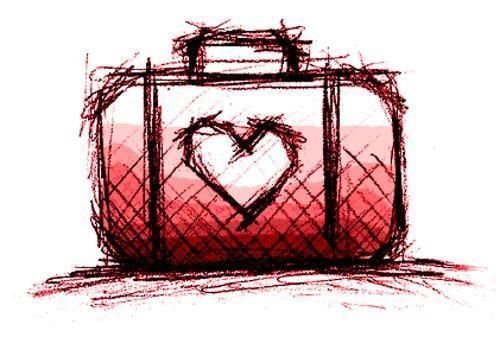Attachment to Things: Your Story of Stuff and the Subtle (and not so subtle) Impact on Moving
/When brain capacity is limited and decision-making fatigue causes overwhelm, how does one possibly make decisions about their belongings in times of major life transition.
Many who know me, know that I’m passionate about simplicity and sustainability. I don’t write much about it as much is written about simplicity from a sorting and organizing standpoint, I rather choose to wrestle with the ideas in private (or my children’s rooms!).
But what I have learned in the 20 plus years in this field, is that those who seek out simplifying or organizing practices, are not in the same place as our typical clientele in complex transitions who embody brain fog, decision-making fatigue, lack clarity about where they will be living, and seek vocational answers.
I’ve been there many times, and I feel the emotional weight alongside of you.
If I were sitting down with you, I’d start by asking, “What is your attachment to things? What is your story of stuff?“
Let me give you a quick peak into my story of stuff. I grew up in a big family and in a home where we moved A LOT! Like 30 times by the time I was 30. (That’s another story.) My things would disappear and I didn’t know where they went or how they re-homed. (I still don’t). I grew up not particularly attached to things, although remember being creative with what we had and while not wealthy, we were also not lacking.
In addition, my story with stuff includes going to college in a different state at the age of 18, via airplane. I didn’t have guidance on what or how to pack. I remember feeling overwhelmed and uncertain. This happened again in moving back home at the end of my freshman year, without plans to return, due to unforeseen circumstances.
Several years later I found myself moving overseas for the first time, and once again via plane and overpacked 70 pound bags, too big to carry and uncertain of what I really needed. I wore layers of clothing this time and resembled that of a homeless person.
My attachment to things found a tipping point in the incredibly difficult transition in my re-entry and leaving of England. Once again I had little help, guidance or ability to process the weight of what I had accumulated. I remember most of the breakable items I brought back in suitcases, perfectly breaking as if a puzzle; unsure of whether to be put back together or discarded. I was forced to ask, were these memories worth keeping or now junk? I had little capacity to discern.
Fast forward several years, with me immediately out of grad school, I started an organizing business for people who had recently lost a love one. I was postured as an organization coach and grief care specialist. By this point I had studied attachment as a major and researched much on organization as well as implemented what I learned from living it firsthand. In this business called transition light, I listened to individuals in a time of sensitive loss and noted if they were able to also be in a place to start sorting. Many times the answer arose as they told stories and would rather reminisce and grieve. It wasn’t a fast process, but it was a beautiful and sacred one.
It’s now not lost on me, how this work gave me an outlet and ability to guide others where I lacked guidance in the past. It allowed me to give in an area where I wished I had been given - time and support.
I saw one of the unique needs was to just be with people in their grief. I recognized many felt alone; our western culture approaches grief in solitude, so my attempt was to provide a with-ness in this typically isolated space.
I would start by asking clients one primary question: Do you want to keep, sell or donate these treasures? In any given 2-3 hour session I would ask this question dozens of times. I recognized with time, and vocational transition, that many elements of that very practical grief work applies to working with cross-cultural workers who are leaving their home country or re-turning home.
Regardless of one’s history with stuff, expatriates quickly become experts at packing, repacking and living out a suitcase. We recognize moving is an inevitable part of the job. However we forget that belongings and decisions about belongings require an incredible amount of mental energy and reflect the many places we have called home. As well, they reflect our deeper “stuff story” and how we have processed (or not) the many changes in our lives.
For those reasons, I decided to jot down a few transferable-skills learned in this work. If I were sitting with you in your home, acknowledging the layers of grief, and tedious task ahead of you, here’s what I would offer:
1. Start Early/Sort Often:
Sorting for an hour a week can save you weeks of work in a stressful season of transition. Keeping it simple and doing it a little at a time is often the best preventative help. If a move is likely on the horizon, start sorting (not packing) as soon as you possibly can. That way when the time comes to actually putting things in boxes you are not sorting, you are just packing.
That said, organizational professionals all agree you want to limit the number of “touches” with every item. If you think of every item as a decision, consider how you will be making hundreds. Limiting the number of touches, will cause to also limit the decisions and save your brain capacity for the items that matter most and decisions which are more meaningful. If you can make a quick decision about an item, make it now and try not to “touch” it again.
2. Employ Help:
Whether you regularly use the Marie Kondo method or tend towards hoarding for a rainy day, we all have our areas relating to stuff that are uniquely valuable to us. Having an objective outsider in the conversation with you can be incredibly helpful as you contemplate each item. The majority of the work I did in the job listed above was come alongside of people in a time of bereavement and help them just to think, making one small decision at a time. As I mentioned, I would ask them to decide whether to keep, sell or donate. The 3-part question included creating 3 piles: a yes, no and maybe pile. Walking with people in this process can be tedious, but a huge gift. In the end, be willing to take the piles to wherever they are needed to go – garbage, recycling, donation center, etc.
3. Implement Creative Conservation In addition, I suggested creative ways of “keeping” things without having to actually hold onto the items themselves. Take a picture, have someone make you a quilt of those 50 t-shirts, donate your 50 ball jars, or repurpose those tins into storage containers…Think creatively (but not too long) about how to recycle or repurpose the unwanted items that you can not or should not keep. The part I found most fascinating is that almost anything in the “maybe” pile quickly made it to the “no” pile if they knew someone else who could use it. I created a list of local places that I could network with who needed specific belongings. Giving away hard to give away items becomes easier even with those with “everything is a treasure” tendencies. The belongings became so much easier to let go of if we thought someone else would treasure it as well. More on that in the article decision-making during transition.
4. Limit the Selling Period
When we recently moved we had good stuff, not amazing and not new. But good. And priced fairly (I think). I created an elaborate google document with pictures and detailed explanations of each item so we could avoid lots of messages. (this may be an area to delegate). We were shocked that every SINGLE thing on the list sold to people in our network! It felt like a sheer miracle (there were over 50 items...think appliances and furniture and such.) and we received over $3000. We wrote about the details on a different blog,
5. Exercise Good Self-Care
Besides helping people sort their things into 3 piles, the other top value I was needed for most was reminding people to take care of themselves. BREATHE, BREAKS, WATER, FOOD, SLEEP. Very basic and very necessary self-care requirements for good and effective decision-making.
The most obvious – breathe – is one nearly everyone needs help with. Physiologically speaking, it makes sense that in times of stress we hold our breath in a fight, flight or freeze posture. Once you notice this, it becomes quite incredible we don’t pass out given how often we hold our breath when doing stressful things. The other, take breaks was one I learned through my own research. Your brain can’t handle making too many decisions and 2 consecutive hours at a time is approximately the amount of time we have capacity for.
In the end, the question that remains, “Is selling your treasures before leaving worth your time?” What does it reflect of your stuff story? For me, it included facing the value my current belongings had not just in my physical space, but emotionally as well. My answer to if it was worth it includes consideration of where you are leaving, where you are going and what value you place on these items in addition to the network of people you have to work with.
My last experience of repatriating included a gracious and redemptive gift to me: People who needed items we were selling, and time to grieve, let go and say goodbye. This move became for my memory a valuable re-write in my story, a new experience of support and guidance. There was healing happening that was done as I transitioned one more time.
And while I am becoming more sentimental to belongings, I still highly value simplicity. In the end the voice I hear is that this item is temporary, earthly treasure. And simultaneously, the ongoing invitation to letting go points me to a different and deeper understanding of an area of welcome growth. One that is highly personal and requires grace for myself and others.
And…the reminder that this too shall pass!















